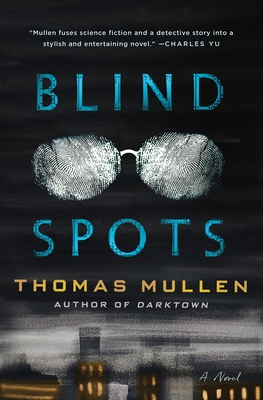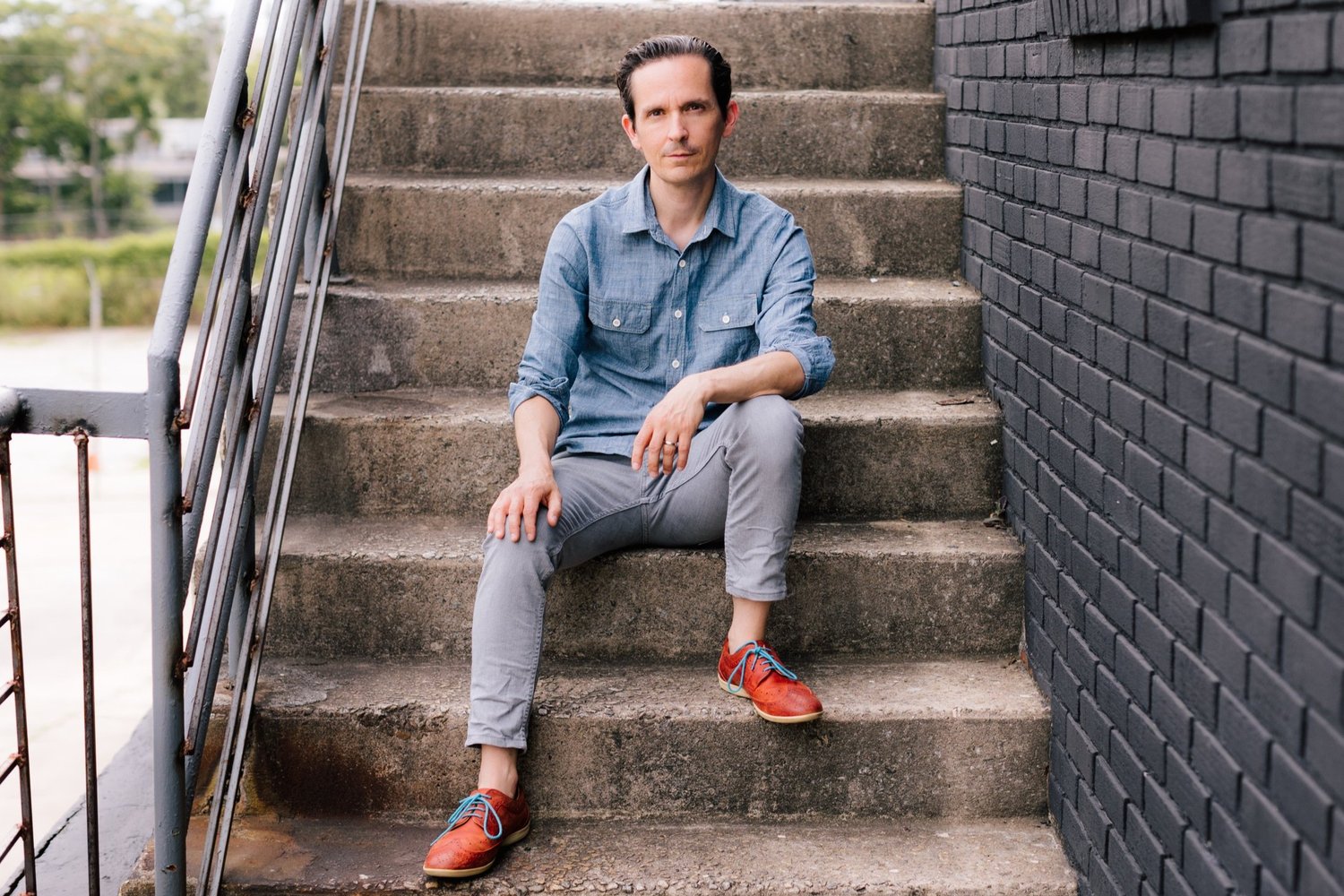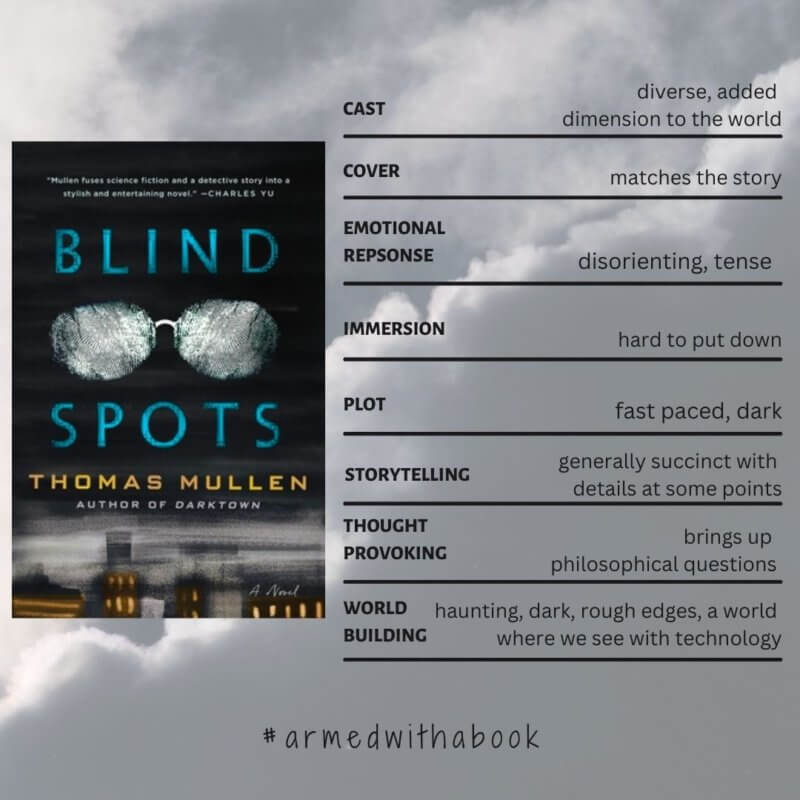Welcome, friend! Yesterday, I shared how much I enjoyed Thomas Mullen’s Blind Spots. I am excited to have been able to connect with him and bring this interview to you. 🙂 Let’s do a quick review of what the book is about:
Blind Spots
by Thomas Mullen

A riveting crime novel with a speculative edge about the ways our perceptions of reality can be manipulated.
Seven years ago, everyone in the world went blind in a matter of months. Technology helped people adjust to the new normal, creating a device that approximates vision, downloading visual data directly to people’s brains. But what happens when someone finds a way to hack it and change what people see?
Homicide detective Mark Owens has been on the force since before The Blinding. When a scientist is murdered, and the only witness insists the killer was blacked out of her vision, Owens doesn’t believe her—until a similar murder happens in front of him. With suspects ranging from tech billionaires to anti-modernity cultists—and with the bodies piling up—Owens must conduct an investigation in which he can’t even trust his own eyes.
Thomas Mullen, the acclaimed author of Darktown and The Last Town on Earth, delivers an unputdownable crime novel about one man’s search for truth in a world of surveillance and disinformation that’s all too recognizable.
Content notes include mental health, gun violence, violence, death, murder, surveillance.
Hi Thomas. Welcome to Armed with A Book! 🙂 Please tell me and my readers about yourself.

I’m the author of six previous novels, which all tend to be fairly different from each other, but which all delve into either historical fiction, crime, or speculative fiction—or some combination of the three. As a reader, I find that well-written stories that combine elements of different genres tend to be my favorites, and that’s how I like to write as well.
Blind Spots is a speculative crime thriller, set in the future. Have you explored similar ideas in your previous books?
I’ve dabbled in speculative before, definitely. My third novel, The Revisionists, is a post-9/11 paranoid spy novel set in Washington—and one of the characters is a time traveller from a perfect future. And my second novel, The Many Deaths of the Firefly Brothers, is about a family of Depression-era bank robbers who keep getting killed and waking up the next day, unharmed. So yeah, I tend to gravitate toward the borders between different genres and have fun playing over there.
What inspired the idea for Blind Spots?
Many years ago I happened to read two novels in quick succession that made clever use of redactions and censored content. One was a CIA spy thriller (AN ORDINARY SPY by future-“The Americans” showrunner Joel Weisberg) and one was a literary novel from Iran (CENSORING AN IRANIAN LOVE STORY by Shahriar Mandanipour). In both books, parts of the story are censored by black bars, so the reader doesn’t know what it is that’s being kept from them. Somehow, from there I got the idea of a killer who could move around looking to all the world like a black censor bar, redacted from everyone’s view. I liked the idea, and from there I sketched out the world that could make such a scenario possible.
Tell me about the world before the Blinding happened.
Honestly, that would pretty much be our world today. I wanted the world of the book to mostly feel the same as ours, until this unexplained and terrifying event where we everyone gradually lost the ability to see and had to come up with a technological solution for that.
This world after the Blinding felt drastically different to me from our present. What kind of research did you pursue for this book?
Well, it’s different but also not all that different. I had to make a lot of changes due to the unique ways in which people have to navigate the world, using vidders instead of their eyes, but otherwise I’d argue that it’s quite a similar world to ours today, with a lot of the same social and political troubles. So much of the research just meant being alert to the issues and debates and divisions in our world now.
Your book offers commentary on the consequences of introducing a widespread technology in society, one that people heavily rely on. I enjoyed how you set all this up and explored it through the characters and plot. Were there questions about society that you wanted to explore through Blind Spots?
Thanks! Since at least Frankenstein, we’ve used fiction to explore our fears about how new technology affects us. These days we all carry computers and video cameras in our pockets, and we stare at screens for a good part of our day, and that’s wrecking havoc on our attention spans, our ability to socialize in person, and so many other things. The manipulation of social media for political ends, which had a huge impact on the 2016 elections and certainly hasn’t gone away, is another key issue today; there are legitimate fears that democracy itself could crumble partly because we’ve all been getting distorted feeds about what is actually happening in the world around us, and because we’ve lost the ability to communicate with each other. We can’t really trust what we see anymore, so yeah, all of these ideas and fears were things I was exploring when I wrote.
Which part of the plot would you say was the most challenging to write in Blind Spots?
Sometimes it’s all hard. Sometimes it all moves more quickly than you expected. Honestly, it changes day to day. The scenes in which one of the main characters is blind was a challenge, but at the same time those may be my favorite scenes in the book. Empathy and imagination are so important for writing fiction.
For someone who loved Blind Spots, please recommend three books to check out next.
How about four? If you’re interested in books that combine speculative fiction with elements of noir and crime, I’d go with The City and the City by China Mieville (Goodreads), Shovel Ready by Adam Sternbergh (Goodreads), and The Shining Girls by Lauren Beukes (Goodreads), and The Inuitionist by Colson Whitehead (Goodreads).



Your book, Darktown, is being developed for television by Sony Pictures. Congratulations! What is the book about? Are you involved in writing the screenplay?
Thanks! Yeah, Hollywood and I have had a few dances over the years. Nothing’s ever worked out, which is often how it goes, but there’s always hope. Darktown and the following two books are set in mid-Century Atlanta, during the Jim Crow era and the early victories of the Civil Rights movement, so do I think it could make for a great show.
What advice would you give to a writer new to speculative fiction?
I think this is true for all fiction, not just speculative: the work is part research, part experience, and part imagination. Different books will lean on one of those elements more than others, but they’re all important to creating fully imagined worlds and realistic, compelling characters who draw readers into the story.
Thank you for hanging out with Thomas and me. Connect with Thomas on his website and Twitter.
Add Blind Spots to your TBR on Goodreads. Read my review here. Speculative fiction fans will enjoy this book.

Many thanks the wonderful folks at St Martin’s Press and Minotaur Books for the opportunity to review an advanced copy of Blind Spots and to interview Thomas.

Be First to Comment